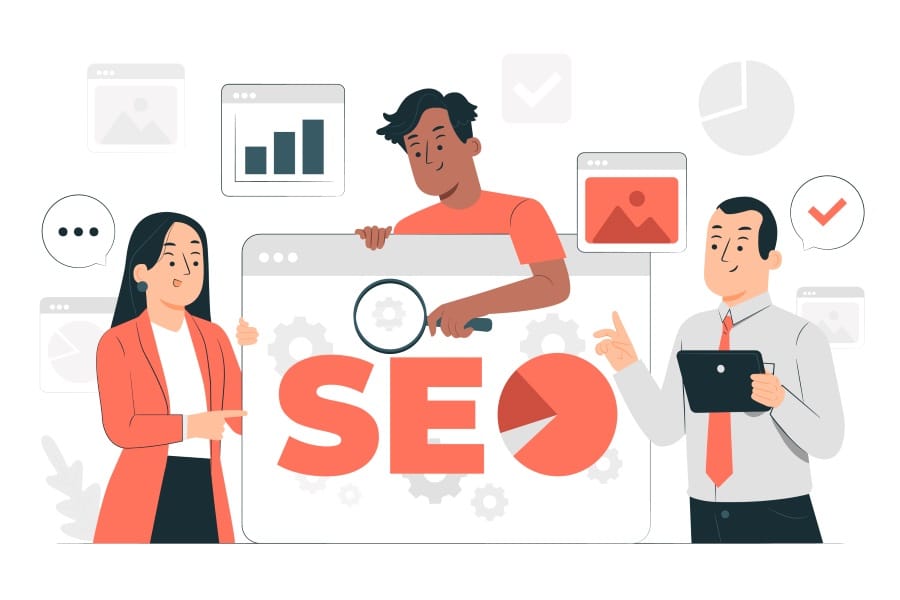In today’s digital era, Search Engine Optimization (SEO) has become a critical factor in driving online success for businesses. Leveraging the power of SEO can significantly impact your website’s visibility, traffic, and ultimately, your return on investment (ROI). In this comprehensive guide, we will explore the fundamental principles and actionable strategies to help you grow your business with SEO.
Table of Contents
Essential SEO Work Strategies to Drive Business Growth:
I. Understanding SEO Basics
What is SEO?
SEO, or Search Engine Optimization, is the practice of optimizing your website and online content to improve its visibility and ranking in search engine results pages (SERPs). Businesses can attract more organic traffic and potential customers by using relevant keywords and adhering to search engine guidelines.
Importance of SEO: In today’s digital landscape, where billions of searches are conducted daily, SEO is essential for businesses to be found by their target audience. It helps businesses stay competitive, increase brand exposure, and drive valuable leads and conversions.
The role of search engines in online business: Search engines like Google, Bing, and Yahoo serve as the primary gateway for users to find information, products, and services. SEO ensures that your website appears prominently in search results when users search for keywords related to your business.
How Search Engines Work
Crawling and indexing: Search engines use automated bots (crawlers or spiders) to navigate the web and discover new content. When a crawler finds a new page, it adds it to the search engine’s index, making it eligible to appear in search results.
Ranking factors: Search engines use complex algorithms to rank web pages based on various factors. These include relevance to search queries, content quality, backlinks, site speed, mobile-friendliness, and user experience.
Benefits of SEO for Business Growth
Increased organic traffic: With effective SEO strategies, your website will attract more organic (non-paid) traffic from search engines, leading to a steady stream of potential customers.
Enhanced brand visibility and credibility: Higher rankings in search results establish trust and credibility among users, as they often associate top-ranked websites with authority and reliability.
Higher ROI compared to traditional marketing: SEO is cost-effective and delivers long-term results. Unlike traditional advertising, which requires continuous spending, SEO efforts can yield sustainable benefits over time.
II. Keyword Research and Analysis
Importance of Keyword Research
Identifying relevant keywords and phrases: Keyword research involves finding the words and phrases users type into search engines when looking for products or services similar to yours. Understanding these keywords allows you to tailor your content accordingly.
Understanding user intent: Keyword research helps you grasp the intent behind users’ search queries. By aligning your content with user intent, you can provide valuable solutions, driving higher engagement and conversions.
Tools for Keyword Research
Google Keyword Planner: This free tool by Google provides keyword suggestions, search volume data, and competition levels, making it an essential resource for beginners.
SEMrush: A comprehensive SEO tool that offers keyword research, competitor analysis, and site auditing capabilities, among other features.
Ahrefs: Known for its extensive backlink analysis, Ahrefs also offers robust keyword research tools and domain tracking capabilities.
Conducting Keyword Analysis
Competitor analysis: Analyzing your competitors’ target keywords helps you identify gaps and opportunities in your SEO strategy. Tools like SEMrush and Ahrefs can provide valuable insights in this regard.
Long-tail keywords vs. short-tail keywords: Long-tail keywords are more specific and often have lower search volume but higher conversion potential. Short-tail keywords are broader and have higher search volume but can be more competitive.
III. On-Page SEO Techniques
Optimizing Website Structure
User-friendly navigation: Ensure your website is easy to navigate, with clear menus and well-organized content. A logical site structure helps users quickly find what they’re looking for and encourages them to explore more.
URL structure and best practices: Use descriptive, keyword-rich URLs that accurately reflect the content of each page. Short, readable URLs are more user-friendly and may improve click-through rates.
Crafting High-Quality Content
Importance of unique and valuable content: Content is at the heart of SEO. Create informative, relevant, and engaging content that addresses your audience’s pain points and provides solutions to their problems.
Incorporating target keywords naturally: Avoid keyword stuffing (overusing keywords unnaturally) and focus on writing for your audience. Use keywords in titles, headings, and throughout the content in a way that sounds natural and flows well.
Title Tags and Meta Descriptions
Writing compelling titles and meta descriptions: The title tag and meta description are crucial for enticing users to click on your link in the search results. Craft unique and captivating titles that accurately describe the content, and write meta descriptions that offer a compelling preview of what users can expect on the page.
Optimizing for click-through rate (CTR): A higher CTR signals to search engines that your content is relevant and valuable to users, potentially leading to improved rankings.
IV. Technical SEO
Site Speed Optimization
Impact on user experience and SEO rankings: Site speed directly affects user experience, and slow-loading websites can lead to higher bounce rates. Additionally, search engines consider site speed as a ranking factor.
Tips for improving page loading times: Optimize images, leverage browser caching, minimize HTTP requests, and consider using Content Delivery Networks (CDNs) to distribute content closer to your users.
Mobile-Friendly Websites
Importance of mobile optimization: Mobile devices now account for a significant portion of internet traffic. Having a mobile-friendly website is critical to cater to this audience and improve your mobile search rankings.
Responsive design vs. mobile versions: A responsive design ensures that your website adapts to different screen sizes and devices, while a separate mobile version can also be effective if appropriately optimized.
URL Canonicalization
Avoiding duplicate content issues: Duplicate content can confuse search engines and negatively impact rankings. URL canonicalization helps consolidate the same content under a single, preferred URL.
Setting preferred domain version: Choose whether your website should be accessed with or without the “www” prefix, and set the preferred version to avoid duplicate content problems.
V. Off-Page SEO Strategies
Backlink Building
Understanding the significance of backlinks: Backlinks, also known as inbound links, are links from other websites that point to your site. Search engines consider backlinks as votes of confidence, indicating that your content is valuable and authoritative.
Building high-quality, authoritative links: Focus on earning backlinks from reputable websites in your industry. You can achieve this by creating outstanding content, engaging in guest posting, and fostering relationships with influencers and industry leaders.
Guest Posting and Influencer Outreach
Leveraging guest blogging for SEO and exposure: Guest posting on relevant websites helps build backlinks and exposes your brand to a broader audience.
Collaborating with influencers in your niche: Partnering with influencers can extend your reach and credibility, as they often have dedicated and engaged followers.
Social Media Marketing
The role of social signals in SEO: While social media signals are not direct ranking factors, they can indirectly impact SEO by increasing content visibility, engagement, and brand awareness.
Strategies for engaging with your audience: Develop a consistent social media presence, share valuable content, and encourage interactions with your audience through contests, polls, and Q&A sessions.
VI. Local SEO Tactics
Optimizing for Local Searches
Setting up Google My Business: Claim and verify your business listing on Google My Business, providing accurate and up-to-date information.
Local keyword targeting: Use location-specific keywords throughout your content to target local customers.
Local Citations and Directories
The importance of consistent NAP (Name, Address, Phone) information: Ensure your business information is consistent across all online directories and citation sources.
Listing your business in relevant directories: Register your business in local directories, industry-specific directories, and review sites to improve local visibility and credibility.
VII. Measuring and Tracking SEO Performance
Utilizing Google Analytics
Setting up tracking for website metrics: Install Google Analytics on your website to track essential metrics, such as organic traffic, user behaviour, bounce rates, and conversion rates.
Analyzing organic traffic and user behaviour: Analyze how users find your website, which pages they visit, and how they engage with your content. Use this data to make data-driven decisions for improving your website’s performance.
Monitoring SEO Progress
Regularly checking keyword rankings: Monitor how your target keywords perform over time. Keep track of changes in rankings and adjust your strategy accordingly.
Evaluating your SEO efforts’ effectiveness: Measure your SEO campaigns’ impact on organic traffic, lead generation, and revenue. Identify successful tactics and areas that require improvement.
Unlock Growth Potential with Strategic SEO
SEO is a transformative tool that can elevate your business in the competitive online landscape. By mastering essential SEO practices—such as thorough keyword research, optimizing on-page and technical aspects, and implementing effective off-page and local SEO strategies—you’re setting the stage for substantial growth. Understanding these fundamentals allows you to attract more traffic, engage your audience, and increase conversions.
Achieve Success with HITS Web SEO Write’s Comprehensive SEO Services
SEO is a continuous journey, demanding commitment and adaptability to stay ahead of algorithm changes. HITS Web SEO Write provides complete SEO services to help your business rank effectively and expand its online reach. Our tailored approach ensures your brand not only gains visibility but also flourishes in the digital world. Embrace these strategies, partner with us, and watch your online presence and business potential soar. Happy optimizing!




